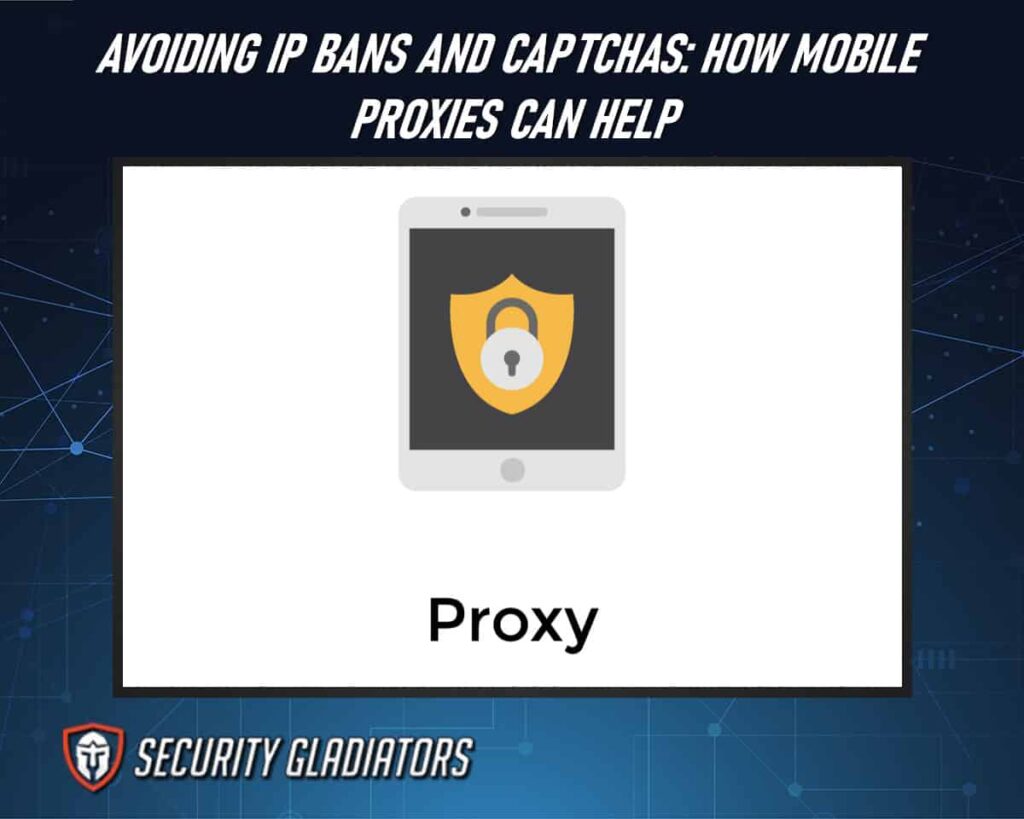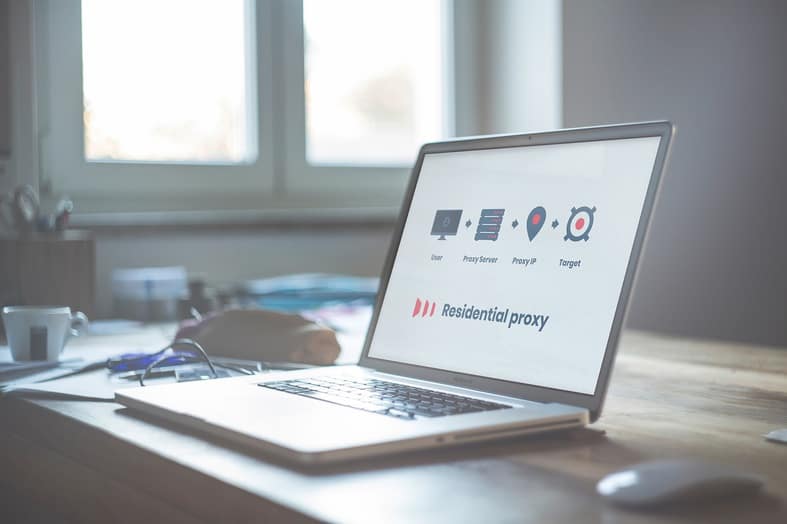
To overcome these obstacles, mobile proxies have emerged as a valuable tool for web scrapers. Mobile proxies act as intermediaries between the scraper and the target website, masking their true IP address with that of a mobile device. This allows for more anonymity and avoids detection by websites that impose IP bans or require CAPTCHAs. By utilizing mobile proxies, web scrapers can navigate through these restrictions seamlessly, enabling them to collect data efficiently and effectively. With session management and residential IPs being key features of mobile proxies, they offer practical solutions for web scrapers seeking to master their craft. Session management ensures that each request made by the scraper appears as if it is coming from a unique user session rather than a bot. Residential IPs provide further authenticity by assigning an IP address associated with real mobile devices instead of data centers commonly used by scraping tools.
Table of Contents
What Is an IP Ban?
An IP ban refers to a type of ban that blocks access to a website or online service based on the user’s IP address, often implemented as a measure against malicious activities or violations of terms of service. This ban can be particularly problematic for web scraping tasks, where automated bots extract data from websites. Mobile proxies offer a solution to overcome such bans by providing users with a different IP address, making it difficult for websites to detect and block them. By routing internet traffic through mobile devices and their associated IPs, a proxy for mobile allows web scrapers to evade detection and continue their scraping activities without interruptions. Additionally, a mobile proxy can also help bypass CAPTCHAs, another common obstacle faced by web scrapers.
What Are CAPTCHAs?
CAPTCHAs are widely used security measures implemented on websites to ensure that human users, rather than automated bots, are accessing the site. They typically consist of distorted images or puzzles that require users to perform a specific task, such as typing in a series of characters or selecting certain images. CAPTCHAs serve as a barrier for web scraping tools and prevent automated bot activity by creating an additional layer of authentication. However, CAPTCHAs can also pose challenges for legitimate users who may find them time-consuming and frustrating to solve.
What Are the Challenges of IP Bans and CAPTCHAs?
IP bans and CAPTCHAs are two common challenges that individuals and automated bots may encounter when web scraping, automating tasks, or accessing certain websites. These measures are implemented by website owners to protect their content and resources, maintain server performance, and prevent abuse.
Here are the challenges associated with IP bans:
Detection and Blocking
Websites often employ various techniques to detect and block suspicious or automated traffic. These include monitoring patterns of requests, analyzing user-agent strings, and tracking IP addresses. If your IP address is flagged as a source of automated or unwanted traffic, you may be temporarily or permanently banned from accessing the site.
Dynamic IP Address
If you have a dynamic IP address, your IP may change periodically. However, this doesn’t guarantee immunity from IP bans, as websites can employ more sophisticated methods to identify and block bots.
Proxy Usage
Some individuals and bots use proxies or VPNs to circumvent IP bans. While this can help evade bans, it’s not foolproof, as websites can also detect and block known proxy IP ranges.
Legitimate Users Affected
IP bans may inadvertently block legitimate users who share the same IP address range with the bot. This can lead to a negative user experience for innocent users.
Here are the challenges associated with CAPTCHAs (Completely Automated Public Turing test to tell Computers and Humans Apart):
Human Verification
CAPTCHAs are designed to differentiate between humans and bots. They require users to solve puzzles, identify objects, or perform tasks that are relatively easy for humans but challenging for automated scripts. This adds an extra layer of authentication for accessing a website’s content.
Time-Consuming
CAPTCHAs can be time-consuming, especially if you encounter them frequently during a web scraping or automation task. This can slow down your processes and reduce efficiency.
Solving CAPTCHAs
Automated bots may struggle to solve CAPTCHAs, and some websites continuously evolve their CAPTCHA systems to make them even more difficult for bots to bypass. This requires ongoing development and maintenance efforts for those using automation.
APIs and Services
Some websites provide APIs or services that allow authorized access to their data without the need for CAPTCHA solving. However, these may come with usage limitations and fees, and not all websites offer such solutions.
Accessibility Concerns
CAPTCHAs can be a barrier for users with disabilities who rely on assistive technologies. Websites must provide alternative methods for these users to access content.
What Are Mobile Proxies
Mobile proxies, often referred to as mobile IP proxies or 4G proxies, are a type of proxy server that leverages IP addresses assigned to mobile devices and their associated cellular networks. These proxies route internet traffic through real mobile devices, making it appear as if the requests originate from authentic mobile users. This provides a high level of anonymity and is particularly valuable for various online activities such as web scraping, data mining, and bypassing IP-based restrictions. Mobile proxies offer the advantage of using dynamic, frequently changing IP addresses, reducing the risk of detection or blocking. They can provide reliable performance, although this may depend on the strength and stability of the mobile network. Rotation of IP addresses is a common feature, helping users avoid access limitations and IP bans while maintaining their anonymity. Mobile proxies function just like other regular proxies, such as residential and datacenter proxies. Unlike traditional proxies that use data center IP addresses, mobile proxies utilize IP addresses assigned by a mobile Internet Service Provider (ISP). There are both paid mobile proxies and free proxies to choose from. Although free mobile proxies are good, they are not recommended as they may be easily blocked since they are provided by unreliable sources.
Benefits of Using Mobile Proxies
There are several benefits of using mobile proxies:
Enhanced Anonymity
Mobile proxies hide mobile IP addresses and replace them with the IP address of a mobile device, making it difficult for websites or online services to track your online activities.
Bypassing Restrictions
Mobile proxies allow you to bypass geo-restrictions and access websites or online content that may be blocked or limited in your region.
Higher Success Rate
Mobile proxies have a higher success rate in accessing websites or online services that may block or restrict access from traditional proxies or data center IPs.
Faster Speeds
Mobile proxies typically offer faster connection speeds compared to other types of proxies, as they use the mobile network infrastructure, which is designed for high-speed data transfer.
Quality Mobile Network
Mobile proxies use the infrastructure of mobile networks, ensuring a stable and reliable connection, even in areas with limited or unreliable internet access.
Multiple IP Addresses
With mobile proxies, you can easily switch between different IP addresses from various mobile devices, providing more flexibility and options for your online activities.
Web Scraping
Mobile proxies are often used for web scraping, as they can access websites that may block or restrict access from traditional proxies or data center IPs, allowing for more effective data collection.

How Do Mobile Proxies Circumvent Restrictions?
Mobile proxies provide a seamless solution for bypassing website restrictions, ensuring unhindered access to desired information, and enabling efficient data collection processes. By using mobile proxies, users can avoid IP blocks and CAPTCHAs that often hinder web scraping activities.
Here’s how mobile proxies work and how they can help you bypass restrictions:
Dynamic IP Addresses
Dynamic IP addresses are constantly changing and provide a flexible approach to online connectivity. These dynamic IPs, also known as residential IPs, are assigned by Internet Service Providers (ISPs) to their customers. They offer several advantages when it comes to web scraping and proxy management.
Here are two key benefits of using dynamic IPs through mobile proxies:

Enhanced Anonymity
With dynamic IPs, web scrapers can avoid detection by websites that employ IP blocking or banning techniques. As the IP address changes frequently, it becomes difficult for websites to track and block the scraper’s activities. This ensures that the web scraping process remains uninterrupted and the scraper’s identity remains hidden.
Increased Reliability
Dynamic IPs through mobile proxies provide a reliable solution for bypassing restrictions imposed by websites or applications. By rotating IP addresses regularly, mobile proxies prevent getting flagged as suspicious or violating any usage limits. This allows web scrapers to gather data without encountering CAPTCHAs, blocks, or other obstacles that would hinder the scraping process.
Carrier Diversity
Carrier diversity refers to the use of multiple mobile proxies from different carriers or telecommunications companies. This approach helps users overcome IP blocks and CAPTCHAs more effectively by rotating IPs and distributing their web scraping activities across various carriers. By utilizing mobile proxies with carrier diversity, users can avoid detection and mitigate the risks associated with being blocked or flagged by websites. This technique increases the chances of successful web scraping while maintaining anonymity and avoiding restrictions imposed by websites that employ IP blocking or CAPTCHA mechanisms.
User-Agent Spoofing
To enhance anonymity and bypass detection measures, users can employ User-Agent Spoofing, a technique that involves altering the HTTP header information to mimic various web browsers and devices. Web scrapers often utilize this method to mask their true identity and appear as normal web users. By modifying the user agent string in the HTTP request header, web scrapers can imitate different user agents, such as popular browsers or mobile devices. This allows them to access websites without triggering IP blocks or CAPTCHAs that are designed to detect and restrict automated scraping activities. User-agent spoofing combined with other techniques, such as rotating IP addresses through mobile proxies, further enhances the scraper’s ability to overcome obstacles like IP blocks and CAPTCHAs, ensuring smooth data extraction from targeted websites while maintaining anonymity.
Location-Based Access
Location-based access refers to the practice of granting or restricting access to online content based on the user’s perceived location. This strategy is often employed by websites and online platforms to enforce regional restrictions, comply with legal requirements, or personalize content for specific locations. Mobile proxies can be used to simulate a user’s location by connecting to mobile networks in specific geographic regions. This can help bypass geographic restrictions imposed by websites or services.
Session Management
Session management plays a crucial role in ensuring efficient and secure web scraping operations by effectively managing the interactions between a scraper and a website. It enables the scraper to navigate through multiple pages, maintain authentication credentials, and handle various types of sessions. Mobile proxies are an essential tool in session management for web scraping. They provide a way to mask the IP address of the scraper, preventing detection and potential blocking by websites. By rotating IP addresses through mobile proxies, scrapers can avoid being identified as suspicious or potentially harmful bots.
Residential IPs
Residential IPs provide an effective solution for web scraping operations by offering a diverse range of IP addresses that mimic real residential connections, enhancing anonymity and reducing the risk of detection or blocking. These proxies act as intermediaries between the scraper and the target website, allowing users to avoid being identified as automated bots. By using residential proxy services, web scrapers can rotate their IP addresses, simulating different locations and avoiding suspicion from websites. Additionally, these proxies are sourced from real residential networks rather than data centers, making them less likely to be blacklisted or blocked by websites.

Mobile proxy providers often offer residential IPs as part of their services, providing users with a reliable and efficient means of conducting web scraping activities while maintaining a high level of anonymity and bypassing restrictions imposed by websites.
How to Configure and Use Mobile Proxies To Avoid IP Bans and CAPTCHAs
Configuring and using mobile proxies effectively for circumventing restrictions requires careful planning and attention to detail.
Here’s a brief guide:
Choose a Reliable Mobile Proxy Server
Start by selecting a reputable mobile proxy service provider. Look for services that offer a wide range of mobile carrier options, rotating IP addresses, and user-agent spoofing. Ensure they have good uptime and customer support. Popular providers include Luminati, Smartproxy, and Scraper API. Sign up for an appropriate plan based on your needs, as some services offer specialized packages for web scraping, social media automation, or other purposes. You can opt for free mobile proxies if you are on a budget.
Configure Proxy Settings
Once you’ve subscribed to a mobile proxy service, follow their instructions to configure the proxy settings on your device or application. You’ll typically receive details like proxy IP addresses, ports, usernames, and passwords. You may also need to configure user-agent strings and session management settings as per your requirements. It’s crucial to ensure that your setup is correct to avoid leaks or misconfigurations that could expose your real IP address.
Test and Monitor
Before using mobile proxies for any critical tasks, thoroughly test your configuration to confirm that you can access restricted content or websites successfully. Monitor your proxy usage to ensure it’s stable and reliable. Some providers offer dashboards or API endpoints to help you manage your proxies efficiently.
Compliance and Legal Considerations
Be aware of the legal implications of using mobile proxies, especially if your intentions may violate any terms of service or laws. Respect website policies and avoid engaging in activities that may harm or disrupt online services. Always use proxies responsibly and ethically.
Maintenance
Mobile proxies may require occasional maintenance, such as updating user-agent strings or refreshing IP addresses. Stay informed about any updates or changes from your proxy service provider to ensure seamless operation.
Frequently Asked Questions
Are All Mobile Proxies Equally Effective at Avoiding IP Blocks and CAPTCHAs?
No, the effectiveness of mobile proxies can vary depending on the provider and the quality of the proxies. High-quality mobile proxies from reputable providers are more likely to help you avoid IP blocks and CAPTCHAs.
Can I Use Mobile Proxies for Any Online Activity Without Consequences?
While mobile proxies can help you avoid IP blocks and CAPTCHAs, it’s essential to use them responsibly and in compliance with the websites’ terms of service. Excessive or abusive use can still lead to detection and potential consequences.
How Do I Choose the Right Mobile Proxy Provider?
When choosing a mobile proxy provider, consider factors like the quality of their proxies, the number of locations they offer, customer support, and pricing. Reading reviews and doing research can help you make an informed decision.
What Are Some of the Mobile Proxy Networks?
Several mobile proxy networks are available to users seeking dynamic and authentic mobile IP addresses for various online activities. Some notable options include Luminati Mobile Proxy Network, which offers a vast pool of mobile IPs from around the world; Bright Data Mobile Proxy Network, known for its reliability and expansive coverage; and Smartproxy Mobile Network, which provides users with access to mobile IPs from various countries, facilitating global web scraping and data collection tasks. These networks offer users the flexibility and scalability required to meet their specific needs, whether it’s bypassing geo-restrictions, avoiding IP blocks, or conducting web scraping activities.
Are Mobile Proxies Legal To Use?
Mobile proxies themselves are legal tools. However, how you use them determines their legality. Using them for illegal activities or violating websites’ terms of service can lead to legal issues.
Conclusion
Mastering web scraping requires not only technical know-how but also a strategic approach to bypass obstacles like IP blocks and CAPTCHAs. Mobile proxies emerge as a valuable ally in this endeavor, offering dynamic and authentic IP addresses from real mobile devices. By leveraging these proxies intelligently and responsibly, you can significantly enhance your web scraping efforts while navigating the challenges posed by websites’ security measures. Remember, while mobile proxies can save you from IP blocks and CAPTCHAs, ethical and legal compliance should remain at the forefront of your scraping practices to ensure a positive and sustainable online presence.

